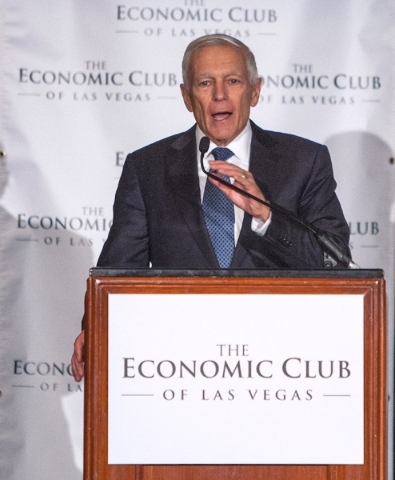Clark: Don’t let would-be leaders get away without having a strategy
Retired four-star Gen. Wesley Clark had one piece of advice for early caucus state voters in Las Vegas: Ask them about their strategy.
Clark, speaking at the end of an address to the Economic Club of Las Vegas on Tuesday, said voters here should take advantage of candidate visits get some insights into how the next commander-in-chief will deal will global military and economic problems.
Said Clark: "Whenever there's a presidential candidate that comes out here and starts talking, would you please ask them, 'What is your strategy?' I don't want a baseball cap that says 'Make America great again.' I want to see a strategy."
Although Clark himself made clear during a lengthy and detailed question-and-answer session that he would not repeat his 2004 bid for the presidency, he shared his own strategies about energy, the Middle East, China and national security.
Clark, a West Point graduate, Vietnam vet and Rhodes Scholar who served as the former supreme allied commander in Europe and oversaw military actions during the Kosovo War, said there's a high degree of disaffection in modern society. That's prompted voters to turn to non-politicians and outsiders such as businessman Donald Trump and Dr. Ben Carson.
"The economy really hasn't lived up to the American dream," Clark said. Real income hasn't risen for average people, but because business has become more and more effective at cutting costs in down times, its revenue has increased. The resulting inequity has fed voter frustration, he said.
Although the Syrian refugee crisis, ISIS and Russia grab most headlines, Clark said the nation faces several looming threats: terrorism, cyber attacks, financial system security, the ascent of China as an economic power and climate change. Those problems require coordinated, public- and private-sector responses, he said. And they each require a strategy.
Clark outlined a path toward energy independence, in which domestic sources of energy (including natural gas and oil) are used during a transition to cleaner fuels. He encouraged more spending on infrastructure and efforts to restart the stalled housing market. (Clark himself is involved in one such effort in San Bernardino, Calif., he said.)
He also said U.S. policy should be to get Saudi Arabia to cut its oil production to see an increase in prices, which would spur U.S. domestic oil production. Currently, he said, the Saudis are trying to undercut American energy companies and put them out of business, to increase reliance on Middle Eastern oil and for the United States to retain strong military ties.
"We need to be fully energy independent, but the Saudis don't want us to be," he said.
Although Clark spent many years of his life at war, he doesn't endorse all of them. He called the Iraq War "the greatest American strategic mistake in this century, maybe two centuries." The former administration of Saddam Hussein was a wedge that kept more radical forces in the region at bay, and toppling his government without a plan to replace it has led to chaos and the rise of ISIS.
"We got rid of the cork in the bottle," Clark said. "We proved that we're not very good at occupying that region."
He scoffed at the idea — advanced by many in the administration of George W. Bush — that the demonstration of American military power in Iraq would lead to flowering democracy across the Middle East. Our form of government is an outgrowth of underlying economic, political and cultural traditions, Clark said. "You can't transplant it and you can't impose it."
Clark stressed maintaining relations with European nations (calling them "people who share our values most closely") in order to deal with threats in the Middle East, China and Russia.
"America can't be safe in the world as an isolated democracy," he said.








